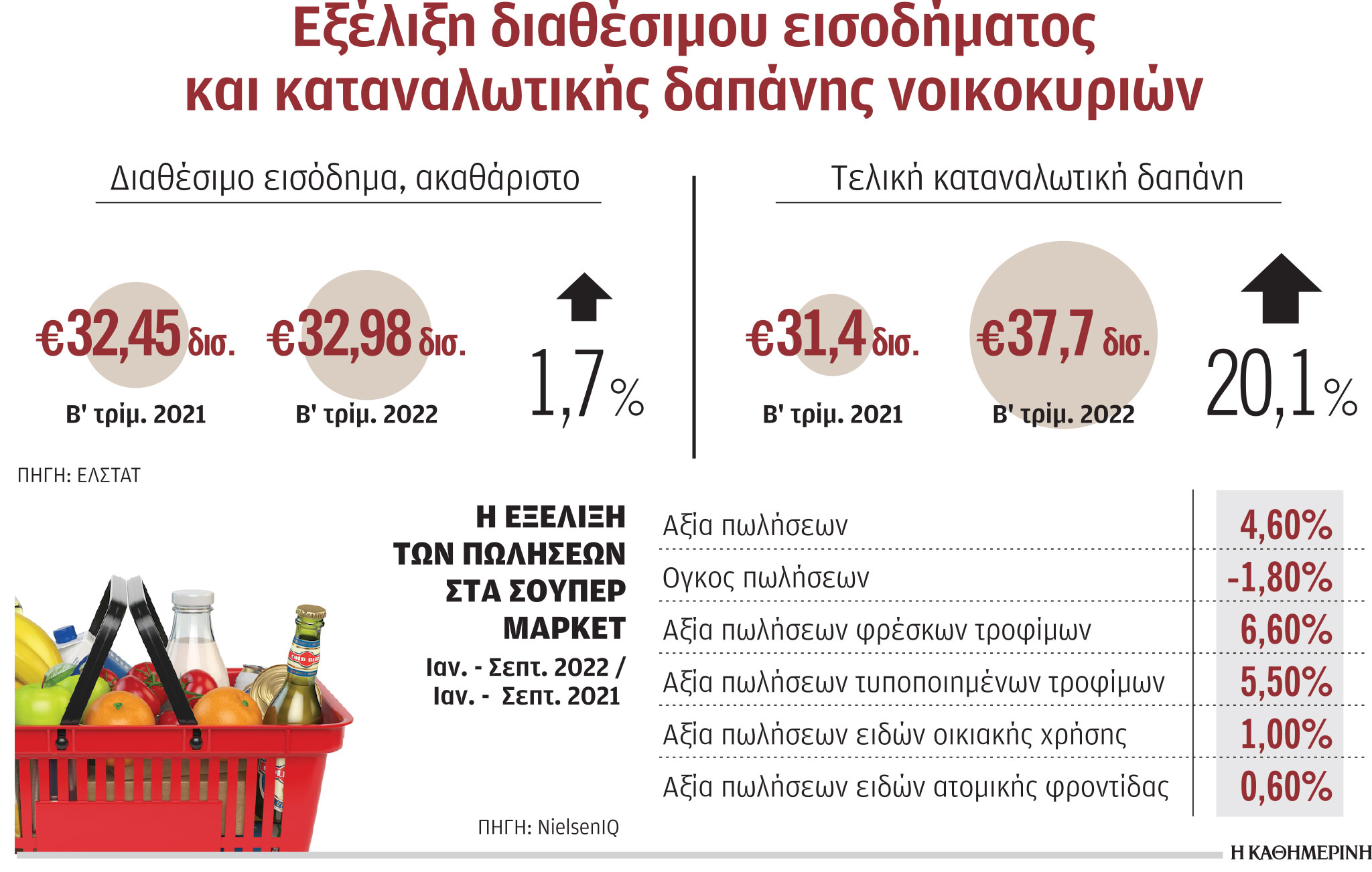
Another 320 million euros were paid by households in Hellas in the nine months of January-September 2022, to buy less products, by only 1.8%, compared to the corresponding period in 2021.
The fact that Mr. inflation makes consumers reach deeper into their pockets to cover basic needs like shopping food and others essentialseffectively negates any increase in disposable income. In fact, now it seems that after two years of growth savingas a result of the limited social activity caused by quarantine, and because of the long, as it turned out, duration accuracythey show a decline this year.
According to her Nielsen IQsupermarket sales in the nine months from January to September 2022 increased by 4.6% compared to the corresponding period in 2021. In absolute terms, according to “Kathimerini” has at its disposalthis means a turnover of 7.278 billion euros (excluding islands and Lidl), compared to a turnover of 6.958 billion in the corresponding period of 2021. And, unfortunately, we have not given another 320 million euros in Supermarket because we consumed more food.
The overall decrease in units is estimated by NielsenIQ at 1.8%. As the market research company itself points out, some of the main categories in the food industry, such as bread and pasta, owe their turnover growth mainly to the growth of their average selling price, which reached 13% and 10.1% respectively, while in the case of vegetable oils, the category average price increased by 38.9%. The change in the average price in the stationery sector and in all major categories included in it was also significant, with the average price of kitchen utensils increasing by 15.6% and toilet paper increasing by 12.7%.

Significant increases in the cost of basic commodities offset any increase in disposable income.
To enable consumers to cope with spending on basic necessities, they limit so-called “spontaneous” purchases, as well as purchases of bazaar goods in the supermarket (clothing, linen, dishes, electrical appliances). This category, despite the rise in prices, shows zero growth, which is reflected in a significant decrease in sales. In addition, consumers seem to be favoring smaller stores again to avoid being lured into larger markets. The largest increase in turnover (5.7%) over the nine months is demonstrated by stores with an area of 100-400 sq.m. In addition, the share of private label products is growing, which, according to NielsenIQ, is 14.4% in nine months (note: Lidl sales are not included).
The image that has developed in the supermarket industry is actually confirmed by its data. Hellenic Statistical Office (ELSTAT). According to them, household final consumption expenditure increased in the second quarter of 2022 by 20.1% compared to the corresponding quarter of 2021, from 31.4 billion euros to 37.7 billion euros. The development is connected, of course, with the fact that in the second quarter of this year there was a much greater economic and social activity compared to the corresponding period last year, since retail trade was closed for a long time, except for food, catering and bans were in effect. when moving from county to county.
At the same time, disposable income showed a very modest growth of 1.7%, not enough to cover losses from inflation. In particular, in the second quarter of 2022 it amounted to 32.98 billion euros against 32.45 billion euros in the second quarter of 2021, while it is clear that it falls short of final consumer spending. The household savings rate, defined as the ratio of gross savings to gross disposable income, was -14.2% in the second quarter of 2022 compared to 3.4% in the corresponding quarter of 2021.
Source: Kathimerini
Lori Barajas is an accomplished journalist, known for her insightful and thought-provoking writing on economy. She currently works as a writer at 247 news reel. With a passion for understanding the economy, Lori’s writing delves deep into the financial issues that matter most, providing readers with a unique perspective on current events.